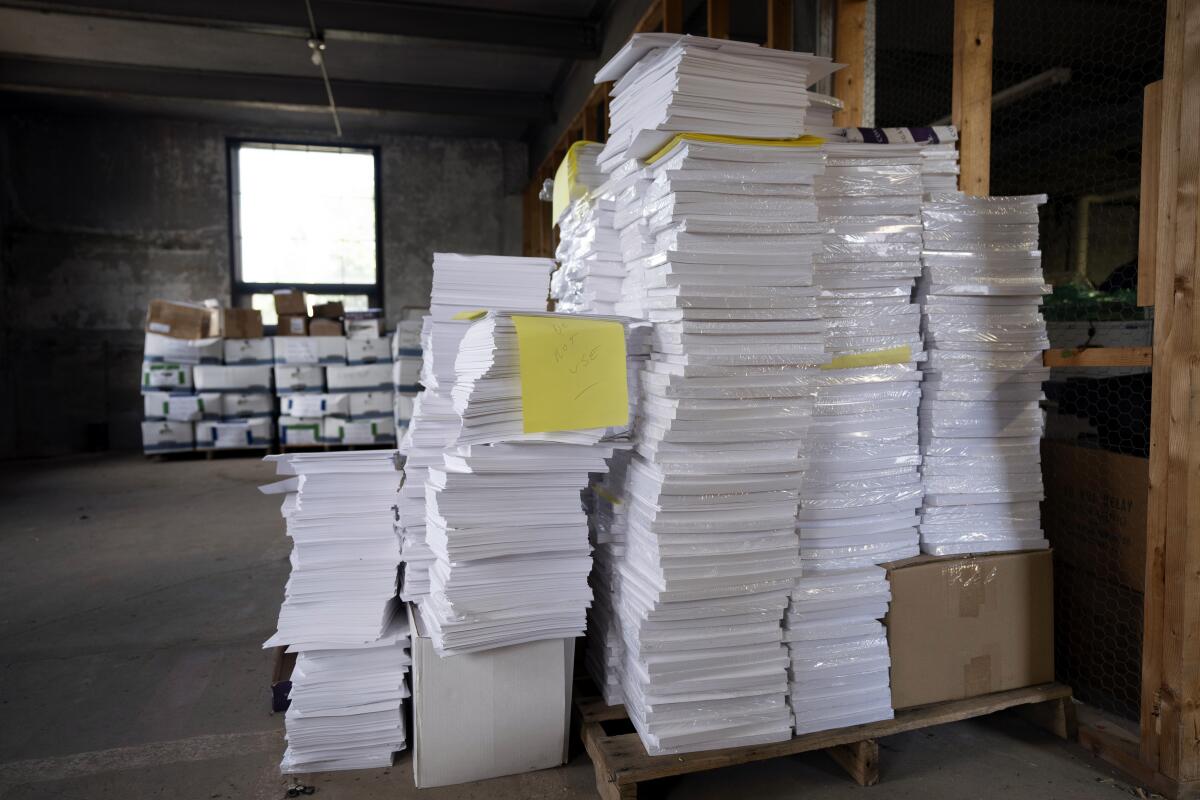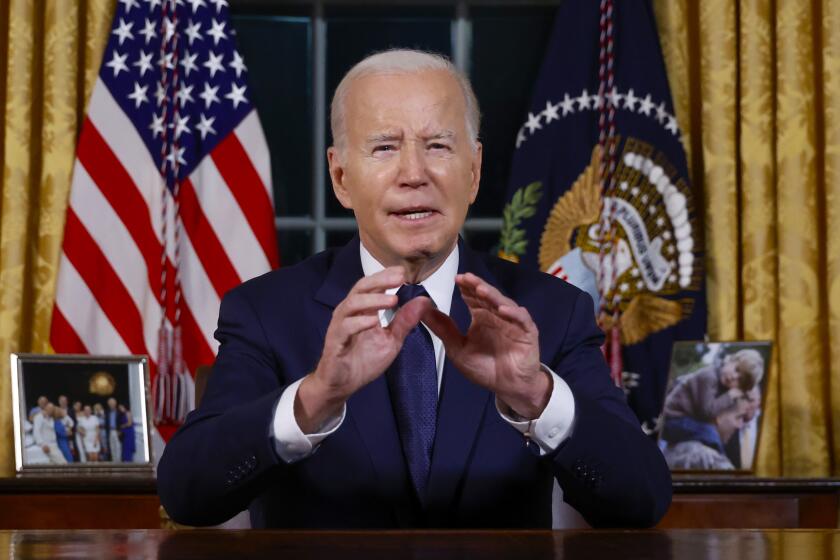Turnover has plagued election offices since 2020. One swing state county is trying to recover

- Share via
WILKES-BARRE, Pa. — The polls had just opened for last year’s midterms in Pennsylvania when the phones began ringing at the election office in Luzerne County.
Polling places were running low on paper to print ballots. Volunteers were frustrated, and voters were worried they might not be able to vote.
Emily Cook, the office’s interim deputy director who had been in her position for just two months, rushed to the department’s warehouse. She found stacks of paper, but it was the wrong kind — ordered long ago and too thick to meet the requirements for the county’s voting equipment.
Conspiracy theories swiftly began to spread: Republican polling places were being targeted; Democrats overseeing elections were trying to disenfranchise Republicans.
“The feeling early on in the day was panic — concern — which grew to overwhelming panic,” Cook said. “And then at some point throughout the day, there was definitely a feeling of people are starting to point fingers — before the day was over, before things were even investigated.”
Column: Biden says the U.S. must help Israel and Ukraine succeed — he’s staking his reputation on it
Presidents are often measured by how they lead in times of crisis. In the wars in Israel and Ukraine, Biden has put his place in history on the line.
The paper shortage, corrected later in the day, turned out to be an administrative oversight by a new staff but has had consequences that are still rippling through the county of 200,000 voters, sowing doubt about how elections are run and leading to a congressional hearing.
It also serves as a cautionary tale about the perils of a change that has been largely hidden from public view but has transformed the election landscape across the U.S. since the 2020 presidential election: an exodus of local election directors and their staff.
Election offices have been understaffed for years. But 2020 was a tipping point, with all the pandemic-related challenges before the presidential vote and the hostility afterward stemming from false claims of a stolen election.
A wave of retirements and resignations has followed, creating a vacuum of institutional knowledge across the country. Experts in the field say widespread inexperience creates risk in an environment where the slightest mistake related to voting or ballot counting can be twisted by conspiracy theorists into a nefarious plot to subvert the vote.
In Pennsylvania, officials estimate 40 of the state’s 67 county election offices have new directors or deputy directors since 2020. The turnover is even more stark in other presidential swing states. In Nevada, election directors in 11 of 17 counties will be overseeing their first presidential election next year, while in Arizona at least 12 of 15 counties have lost at least one top election official.
The dangers are not lost on Al Schmidt, a Republican who helped oversee elections in Philadelphia and faced death threats in 2020. Now Pennsylvania’s top election official, Schmidt said his department has been working to increase training materials and build relationships among local election officials in the hopes of reducing future mistakes.
“There are no redoes of election day,” Schmidt said. “Everything has to be right, and it has to be right every time.”
That has not been the case in recent years in Luzerne County. The 2022 ballot debacle, referred to locally as “papergate,” was just the latest problem in a county that is on its fifth election director in the three years since the 2020 presidential election.
The troubles have only increased doubts among voters, some of whom were already distrustful of elections because of persistent falsehoods about the last presidential contest.
There’s no one reason why the county has experienced so much turnover in its election office, but there is little doubt the churn has added to challenges confronting the department. Staffers reported finding instructions about important election procedures written on scraps of paper.
Hired as an administrative assistant, Cook found herself serving as interim deputy director within a year despite having no previous election experience. When she started in September 2021, the director who hired her gave his notice on her first day. His replacement was on the job about eight months before he, too, left.
“I don’t begrudge anybody that has left,” said Cook, 26, a native of the county. “It is a very difficult role to be in.”
In Luzerne County, the distrust of elections has sometimes boiled over in public meetings. One recent meeting of the elections board focused almost entirely on ballot drop boxes, a frequent target of conspiracy theories.
Frustration also was evident during a congressional hearing last spring into the paper ballot shortage. One local resident, Theodore “T.J.” Fitzgerald, told lawmakers the Democratic-led board of elections was “more interested in drop boxes than making sure there were policies and procedures.”
Dist. Atty. Sam Sanguedolce, a Republican elected in 2021, said he was disappointed the congressional hearing was held before his investigation into the paper shortage was complete. He said there was no evidence of voter suppression and local election officials were in a tough position trying to explain what happened given the active investigation.
“No matter what you were going to say, it was going to be twisted by people who wanted things to be twisted,” he said.
U.S. Rep. Bryan Steil, a Republican from Illinois who chairs the committee that held the hearing, said it provided important answers and accountability for local residents.
A new county manager, Romilda Crocamo, was hired earlier this year — responsible for overseeing everything from Luzerne County’s airport and roads to the election office. She has brought in a consultant to create an elections manual so there would be no confusion about what needs to be done if an employee leaves.
Crocamo has been encouraging staff to be more accessible, hold more public demonstrations about how they work and provide regular updates on election preparations.
“When you don’t do that, then the stories start morphing into something that really isn’t happening,” she said. “We have nothing to hide.”
More to Read
Sign up for Essential California
The most important California stories and recommendations in your inbox every morning.
You may occasionally receive promotional content from the Los Angeles Times.














